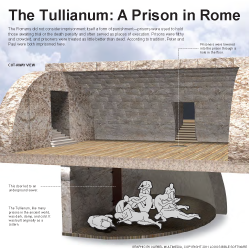6:2 Honor your father and mother Reflects the fifth commandment (Exod 20:12; Deut 5:16). In first century Graeco-Roman society, children were required by law to submit to the authority of their parents. Paul’s instruction, however, is based on the principle of mutual submission (see note on Eph 5:22–6:9). Paul likewise expects that children be treated with respect by their parents (see v. 4).
6:4 do not make your children angry In first-century Greco-Roman society, fathers—as the head of the household—had complete authority within the household to administer discipline. Paul advises them to avoid exercising that authority in ways that might cause their children to harbor resentment. Paul is advocating for fathers treating their children with kindness, which would have been unexpected for Graeco-Roman society; he is arguing that parents treat their children as Christ would.
6:5 Slaves Often considered members of the household in Graeco-Roman culture. See note on 5:22–6:9.
obey your earthly masters Being under Christ’s authority does not mean that believers are free of all civil or social authority. Paul maintains that slaves should serve their human masters as though they were obeying Christ. Graeco-Roman slavery in the first century ad was very different from that of the colonial period (see note on Phlm 10).
6:6 from the heart Implies that believers should have the right motivation for their actions.
6:8 receive back from the Lord God takes account of the kindness and generosity people display to one another.
whether slave or free Elsewhere, Paul states that there is no distinction in Christ between slaves and free people
6:9 giving up threats In Graeco-Roman society, masters had the right to treat slaves as they saw fit. Paul commands masters to set aside their rights and to instead treat their slaves with kindness as people who are equal before Christ (compare note on Eph 6:5).
no partiality See note on Col 3:25.
6:10–20 In the letter’s final teaching section, Paul instructs believers to stand against the evil forces at work in the world. This discussion has three parts: a description of the nature of the battle (Eph 6:10–13), a call to resist the powers by putting on the armor of God (vv. 14–17), and a reminder to pray and be alert (vv. 18–20). |
6:10 become strong in the Lord God gave the Israelites a similar charge before they engaged in battle with the inhabitants of the promised land (Deut 31:23; Josh 1:6).
6:11 full armor of God The book of Isaiah contains imagery similar to Paul’s (Isa 11:4–5; 52:7; 59:17).
able to stand A military expression that refers to a posture of opposition toward an enemy.
stratagems of the devil Refers to the devil’s efforts to disrupt the Church. Paul may have in mind the divisions and false teachings he mentions earlier in the letter (e.g., Eph 4:14, 22, 31; 5:6; compare 2 Cor 2:11). Paul’s use of the Greek word methodeia suggests that the devil is cunning and uses deception to advance his evil purposes (2 Cor 11:3).
efforts to disrupt the Church. Paul may have in mind the divisions and false teachings he mentions earlier in the letter (e.g., Eph 4:14, 22, 31; 5:6; compare 2 Cor 2:11). Paul’s use of the Greek word methodeia suggests that the devil is cunning and uses deception to advance his evil purposes (2 Cor 11:3).
6:12 forces of wickedness Refers to hostile supernatural entities. Because of Christ’s victory over the evil powers, believers have courage and strength to resist them (Eph 1:19–21; 3:10; Col 2:15).
6:14 girding your waist with truth The belt around a soldier’s waist held the breastplate in place and provided an attachment for the sword.
breastplate of righteousness See note on 1 Thess 5:8.
6:16 shield of faith The shield was the soldier’s primary defense in battle. In the same way, the believer’s trust in God provides protection against the devil and his schemes.
6:17 helmet of salvation The assurance of God’s salvation protects the believer just as a helmet protects a soldier in battle. See note on 1 Thess 5:8.
sword of the Spirit This weapon helps believers proclaim the gospel message, act on God’s behalf, and combat attacks from the devil (compare Eph 6:11–12).
word Paul’s use of the Greek word rhēma here primarily refers to the proclamation of the gospel and its ongoing work in the life of the believer (see 5:26 and note; compare Rom 10:17).
6:18 praying at all times Prayer should not be an afterthought for believers, but rather their primary source of strength.
6:19 boldness Refers to courage, especially in public speech. In Acts, Paul’s preaching is characterized by boldness (Acts 2:29; 4:13, 4:31; 28:31).
mystery of the gospel This might refer generally to the good news about Christ, or it could point specifically to the inclusion of Gentiles (non-Jews) into the people of God (Eph 3:4–6; see note on 3:4; compare 2:11–22).
6:20 ambassador in chains Paul was compelled to proclaim the gospel even during his imprisonment (see 3:1 and note).
6:21–24 Paul gives concluding remarks (vv. 21–22) and a benediction (vv. 23–24). |
6:21 Tychicus A companion of Paul during his ministry; courier for this letter, as well as Colossians and likely Philemon (Col 4:7–9). Paul’s remarks about Tychicus in Eph 6:21–22 parallel Col 4:7–8 almost word for word.
A Gentile (non-Jewish) believer from the Roman province of Asia, Tychichus is mentioned throughout the nt as one of Paul’s ministry partners (Acts 20:4; Eph 6:21; Col 4:7; 2 Tim 4:12; Titus 3:12). According to Acts, Tychicus accompanied Paul during his third missionary journey through Asia Minor, Macedonia, and Achaia (Acts 20:4). Paul appears to have trusted Tychicus greatly and commissioned him to carry some of his letters to various Christian communities (Col 4:7–9; 2 Tim 4:12; Titus 3:12). |

|
About Faithlife Study BibleFaithlife Study Bible (FSB) is your guide to the ancient world of the Old and New Testaments, with study notes and articles that draw from a wide range of academic research. FSB helps you learn how to think about interpretation methods and issues so that you can gain a deeper understanding of the text. |
| Copyright |
Copyright 2012 Logos Bible Software. |
| Support Info | fsb |
 Loading…
Loading…




 Tychicus
Tychicus